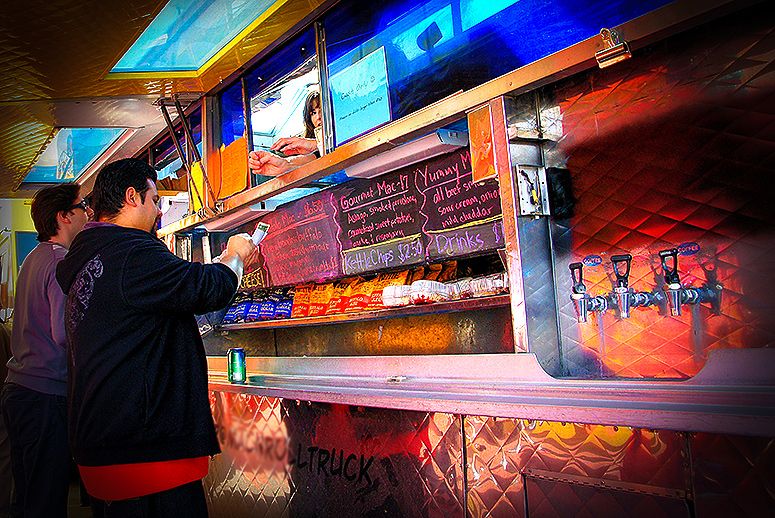
© Flickr
A 26-year-old aspiring chef-cum-philanthropist in Massachusetts wants to retool the food truck trend as a way to feed the homeless—but will he be able to get his Helping Hand Food Truck gassed up and ready to roll?
Last month, Corey Phelan launched a Kickstarter campaign with a noble goal: to serve up fresh food made from locally sourced ingredients out of a food truck to anyone who shows up curbside, regardless of their ability to pay."While the truck will operate as a business to paying customers who are able to afford their food, I would like to take this opportunity to try and change the way business is done," Phelan writes on his Kickstarter page, citing his experience as a volunteer at a homeless shelter when he was younger, combined with his lifelong desire to own his own business.
"Instead of fixed prices for meals, I am going to implement a Pay What You Can/Will policy, which will allow our customers to set the price they think is appropriate for our food and services."It all sounds a bit starry-eyed, to be sure, which is perhaps why Phelan has only managed to raise $635 (as of this writing) toward his goal of $90,000, despite having started his campaign at the end of June.
But at a time when a startling number of municipalities across the country are going so far as to criminalize feeding the homeless, Phelan may very well have hit on a promising way for people do to some good on their lunch break without ending up in handcuffs.
Arnold Abbott, a 90-year-old World War II veteran, made
headlines last fall when he was arrested in Fort Lauderdale, Florida, simply for distributing food to homeless folks in a city park. Abbott ran afoul of Fort Lauderdale's ban on giving food to homeless people on public property, and the city is far from alone in enacting such restrictions.
At least 22 cities, ranging from Raleigh, North Carolina, to Salt Lake City, have passed similar ordinances, with at least 50 more bans attempted or proposed in municipalities nationwide.The flawed rationale behind these bans seems to equate the complex social issue of homelessness with, say, pesky pigeons or Canada geese in city parks: If you feed them, they'll just stick around.
But because we cannot underestimate the American public's susceptibility to believing in simple legislative solutions to remedy complicated social ills that then take years to reveal their wrong-headedness (see, for example, the proliferation of tough-on-crime laws during the 1990s and today's burgeoning prison crisis), we can probably expect more cities to jump on the "don't feed the homeless" bandwagon before all is said and done. In the meantime, a roving band of food trucks like the one Phelan envisions could have the potential to do much good.Cynics may very well be surprised, but there is a rather robust body of
scientific literature that demonstrates most people will, in defiance of conventional economic theory, not only pay
something when confronted with a "pay what you want" option, but will pay more than their fair share if they think it's for a good cause.
How to best put this altruistic impulse to use, however, has seemed to bedevil any number of similar PWYW enterprises, with the launch of the Panera Cares Community Cafés being the most salient example. Restaurant goers can pay nothing or something at these eateries, which are seemingly indistinguishable from the 1,600 other ordinary Paneras across the country, save for the fact that the prices are "suggested." Or they can volunteer an hour's work in exchange for a meal voucher.
The company launched the first nonprofit café in 2010 in St. Louis, but to say progress has been incremental is an overstatement. Panera has opened only an additional four cafés in the past five years, one of which, in suburban Chicago, was shuttered in January.
As any number of food truck entrepreneurs have enthused since the whole upscale meals-on-wheels trend burst on the foodie scene years ago, however, food trucks have a lot of benefits over brick-and-mortar restaurants when it comes to starting your own business, not least of which is the reduced overhead—and that might just be the secret to fuel Phelan's success.
Reader Comments
to our Newsletter